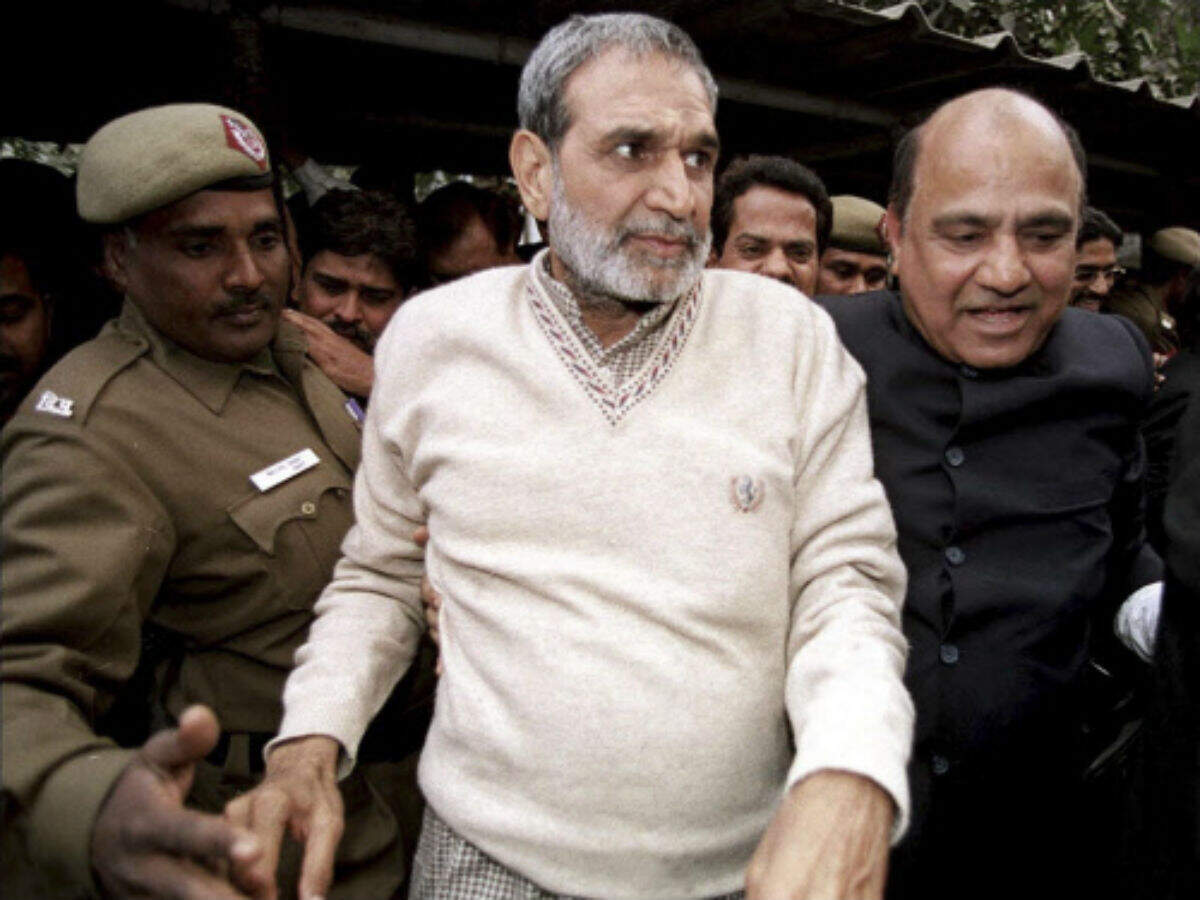Sajjan Kumar convicted in 1984 anti-Sikh riots case: What the Delhi HC said in its verdict
TIMESOFINDIA.COM | Updated: Dec 17, 2018, 23:05 ISTHighlights
- Delivering the verdict, the Delhi HC called for strengthening of the legal system to ensure that perpetrators of mass crimes are made answerable
- The killing of over 2,700 Sikhs in Delhi during the 1984 riots was a 'carnage of unbelievable proportions' and the way the Delhi police acted at that time established their "active connivance" in the brutal murders, the court said

NEW DELHI: The Delhi high court on Monday
convicted and sentenced Congress leader Sajjan Kumar
+ to imprisonment for the "remainder of his natural life" in a 1984 anti-Sikh riots case in which he had been acquitted by a trial court in 2013.
Delivering the verdict, a bench of justices S Muralidhar and Vinod Goel called for strengthening of the legal system to ensure that perpetrators of mass crimes are made answerable.
Here are the highlights of the verdict:
On mass killings and strengthening of the legal system
* Neither 'crimes against humanity' nor 'genocide' is part of the domestic law on crime and this loophole needs to be addressed urgently.
* The riots "answer the description" of crimes against humanity as in the aftermath of Indira Gandhi's assassination, there was "mass killing" of Sikhs in Delhi and the rest of the country, "engineered by political actors with the assistance of the law enforcement agencies".
* Criminals responsible for the mass crimes have enjoyed political patronage and managed to evade prosecution and punishment. Bringing such criminals to justice poses a serious challenge to our legal system. As these appeals themselves demonstrate, decades pass by before they can be made answerable.
* In India, the riots in early November 1984 in which in Delhi alone 2,733 Sikhs and nearly 3,350 all over the country were brutally murdered was neither the first instance of a mass crime nor, tragically, the last but such cases require a different approach to be adopted.
* India has been no stranger to such mass killings since the time of partition in 1947. The mass killings in Punjab, Delhi and elsewhere during partition remains a collective painful memory as is the killings of innocent Sikhs in November 1984. There has been a familiar pattern of mass killings in Mumbai in 1993, in Gujarat in 2002, in Kandhamal, Odisha in 2008, in Muzaffarnagar in UP in 2013 to name a few. Common to these mass crimes were the targeting of minorities and the attacks spearheaded by the dominant political actors being facilitated by the law enforcement agencies.
On trial court order acquitting Sajjan Kumar earlier
* A trial court order of 2013 finding Sajjan Kumar innocent "suffers from manifest illegality" as it "selectively" found the witnesses reliable in respect of other accused, not him.
* The bench said it was "strange" that having accepted the witness testimonies regarding the involvement of the other accused, the trial court performed "a complete U-turn" when it came to believing their statements as far as the involvement of Kumar was concerned.
* The trial court appeared to have "overlooked" the larger dimensions of the crimes as it failed to properly address the charge of conspiracy, despite the fact that detailed arguments were submitted by the CBI in that regard.
* The bench noted that even the evidence led by the prosecution proved "beyond reasonable doubt" that Kumar was the "leader of the mob" and "actively abetted" the commission of crimes "by his repeated exhortations to the mob to indulge in the mayhem and kill innocent Sikhs".
On the role of Delhi police
* The killing of over 2,700 Sikhs in the national capital during the 1984 riots was a "carnage of unbelievable proportions" and the way the Delhi police acted at that time established their "apathy" and "active connivance" in the brutal murders, the Delhi HC said.
* Police had "indeed turned a blind eye and blatantly abetted the crimes committed by the rioting mob" and the probe conducted by them in these cases was a farce.
* A bench noted it was "extraordinary" that despite there being as many as 341 deaths in the Delhi Cantonment area alone over the span of four days beginning November 1, 1984, only 21 FIRs were lodged, of which only 15 pertained to deaths or murders.
* Referring to the case on killing of five Sikhs in Delhi, the bench said that the law and order machinery had clearly broken down and it was literally a free for all situation which persisted.
(With agency inputs)
Delivering the verdict, a bench of justices S Muralidhar and Vinod Goel called for strengthening of the legal system to ensure that perpetrators of mass crimes are made answerable.
Here are the highlights of the verdict:
On mass killings and strengthening of the legal system
* Neither 'crimes against humanity' nor 'genocide' is part of the domestic law on crime and this loophole needs to be addressed urgently.
* The riots "answer the description" of crimes against humanity as in the aftermath of Indira Gandhi's assassination, there was "mass killing" of Sikhs in Delhi and the rest of the country, "engineered by political actors with the assistance of the law enforcement agencies".
* Criminals responsible for the mass crimes have enjoyed political patronage and managed to evade prosecution and punishment. Bringing such criminals to justice poses a serious challenge to our legal system. As these appeals themselves demonstrate, decades pass by before they can be made answerable.
* In India, the riots in early November 1984 in which in Delhi alone 2,733 Sikhs and nearly 3,350 all over the country were brutally murdered was neither the first instance of a mass crime nor, tragically, the last but such cases require a different approach to be adopted.
* India has been no stranger to such mass killings since the time of partition in 1947. The mass killings in Punjab, Delhi and elsewhere during partition remains a collective painful memory as is the killings of innocent Sikhs in November 1984. There has been a familiar pattern of mass killings in Mumbai in 1993, in Gujarat in 2002, in Kandhamal, Odisha in 2008, in Muzaffarnagar in UP in 2013 to name a few. Common to these mass crimes were the targeting of minorities and the attacks spearheaded by the dominant political actors being facilitated by the law enforcement agencies.
On trial court order acquitting Sajjan Kumar earlier
* A trial court order of 2013 finding Sajjan Kumar innocent "suffers from manifest illegality" as it "selectively" found the witnesses reliable in respect of other accused, not him.
* The bench said it was "strange" that having accepted the witness testimonies regarding the involvement of the other accused, the trial court performed "a complete U-turn" when it came to believing their statements as far as the involvement of Kumar was concerned.
* The trial court appeared to have "overlooked" the larger dimensions of the crimes as it failed to properly address the charge of conspiracy, despite the fact that detailed arguments were submitted by the CBI in that regard.
* The bench noted that even the evidence led by the prosecution proved "beyond reasonable doubt" that Kumar was the "leader of the mob" and "actively abetted" the commission of crimes "by his repeated exhortations to the mob to indulge in the mayhem and kill innocent Sikhs".
On the role of Delhi police
* The killing of over 2,700 Sikhs in the national capital during the 1984 riots was a "carnage of unbelievable proportions" and the way the Delhi police acted at that time established their "apathy" and "active connivance" in the brutal murders, the Delhi HC said.
* Police had "indeed turned a blind eye and blatantly abetted the crimes committed by the rioting mob" and the probe conducted by them in these cases was a farce.
* A bench noted it was "extraordinary" that despite there being as many as 341 deaths in the Delhi Cantonment area alone over the span of four days beginning November 1, 1984, only 21 FIRs were lodged, of which only 15 pertained to deaths or murders.
* Referring to the case on killing of five Sikhs in Delhi, the bench said that the law and order machinery had clearly broken down and it was literally a free for all situation which persisted.
(With agency inputs)
Download The Times of India News App for Latest India News.


































All Comments ()+^ Back to Top
Refrain from posting comments that are obscene, defamatory or inflammatory, and do not indulge in personal attacks, name calling or inciting hatred against any community. Help us delete comments that do not follow these guidelines by marking them offensive. Let's work together to keep the conversation civil.
HIDE